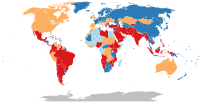
Photo from wikipedia
ABSTRACT This quantitative non-experimental correlational study examined the associations among the predictor variables of first year, first semester nontraditional online learners’ self-regulation, self-direction, and self-efficacy with the criterion variable of… Click to show full abstract
ABSTRACT This quantitative non-experimental correlational study examined the associations among the predictor variables of first year, first semester nontraditional online learners’ self-regulation, self-direction, and self-efficacy with the criterion variable of semester-to semester persistence. A nonprobability convenience sampling method was used to select nontraditional learners enrolled in online undergraduate degree level courses during the Fall semester of the 2018–2019 academic year at a private higher education institution in the Southeast region of the United States. A logistical regression analysis demonstrated that nontraditional online learner semester-to-semester persistence can be explained by the combination of self-efficacy, self-regulation, and self-directedness. The entire model containing all the predictor and criterion variables significantly predicted whether or not first-semester, first-year nontraditional, online learners would persist beyond their second semester at the current institution. The adequacy of the model was further supported by the results of the Hosmer and Lemeshow test, which confirmed that the model is a good fit for predicting online, nontraditional learner persistence.
Journal Title: American Journal of Distance Education
Year Published: 2020
Link to full text (if available)
Share on Social Media: Sign Up to like & get
recommendations!